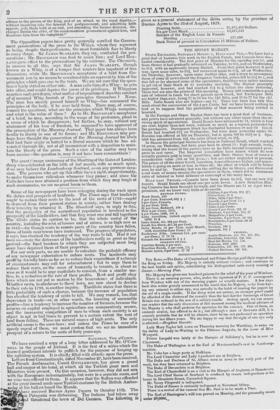Some of the newspapers have been enlarging during the week
upon the duties and prospects of landlords. The Times says that landlords ought to reduce their rents to the level of the rents of 1793—ought to descend from their present station in society, rather than destroy their tenantry by retaining it. The Standard says, in reply to this, that the prosperity of the agricultural population is involved in the prosperity of the landholders, and that they must rise and fall together' The Globe states its opinion to be, that the whole rental of the: country, including the rent of houses and of mines, is as high now as in 1812—for though rents in remote parts of the country have fallen, those of lands near towns have increased. The progress of population, it says, has checked the tendency of the war rents to fall. Had it not been so—were the distresses of the landholders really as great as they pretend—the .fixed burdens to which they are subjected must long since have deprived them of their properties. For our own parts, we are unable to calculate the probable efficacy of any newspaper exhortation to reduce rents. The landlords may profit by friendly hints so far as to reduce their expenditure if a change of circumstances may call for retrenchment ; but to urge them to reduce their rents, on the score of humanity to tenants, is about as wise as it would be to urge capitalists to consent, from a similar mo- tive, to a reduction in the rate of their profits. Rent and profit obey laws which are not put in motion by the benevolence of individuals. Whether rents, in obedience to these laws, are now about to decline to their rate in 1793, is another inquiry. The Globe states that there is ; little probability of such a change, because the increase of population has checked the tendency of rents to fall. We may remark, too, that depression in trade—or, in other words, the lowering of mercantile profits—has a tendency to increase the number of farmers, because the returns on capital employed in agriculture are comparatively secure, and the increasing competition of men to whom such security is an object is apt in bad times to prevent to a certain extent the rent of land from falling. These are natural causes of high rents. The only artificial cause is the corn-laws : and unless the Times be sure of a speedy repeal of these, we must confess that we see no immediate prospect of a return to the rents of forty years ago.


















 Previous page
Previous page